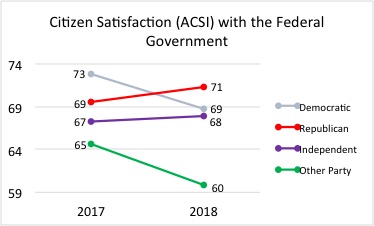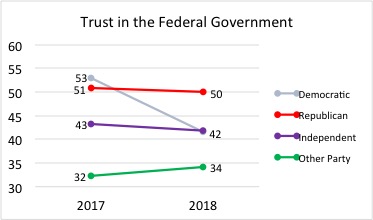Low levels of citizen satisfaction point to a blue-wave midterm
With the midterm elections less than two weeks away, analysts and pundits are pouring over polls, trying to read the proverbial tea leaves to determine how things will shake out in Congress.
Many have predicted an impending “blue wave,” with Democrats retaking the House of Representatives and at least contending for control of the Senate.
{mosads}We took a different approach. Looking beyond individual congressional races and the many generic ballot polls, we sought to uncover how citizens feel about the performance of the federal government nearly two years into the Trump administration: Do these perceptions vary across political parties, and how might they help understand what is coming in the elections?
To answer these questions, we compared data from the annual American Customer Satisfaction Index (ACSI) federal government survey in 2017 to the year-to-date results for 2018.
{mosads}The data includes interviews with almost 5,000 respondents distributed across the country who were asked about their recent experiences with services provided by the U.S. government.
Respondents were asked to rate various aspects of these experiences, including, most critically, their overall satisfaction with the federal government and their trust in the federal government.
Overall, aggregate citizen satisfaction has dipped slightly from last year, down from 69.7 to 68.9 (on a 0-100 scale). Given the many political controversies and partisan fighting over the past year, one might have expected a bigger drop in aggregate citizen satisfaction.
Yet, at least so far, citizens are only slightly less satisfied with the federal government, which might bode well for the party in power.
Party affiliation tells a different story. Citizen satisfaction and its movement over time varies significantly among respondents identifying as Democratic, Republican, independent or the remaining “other party.”

As the chart demonstrates, Republicans and independents are slightly more satisfied with the federal government thus far in 2018 than they were in 2017. However, Democratic and other party respondents are far less satisfied year-over-year, leading to the small downturn in aggregate satisfaction.
On the Democratic side, deteriorating citizen satisfaction would seem to underpin and help explain the enthusiasm edge the Democrats are reported to hold heading into the elections, reflecting a strong desire for a change in how the government is working.
On the other hand, independents, the coveted group in the middle that decide many elections, are slightly more satisfied with the federal government this year than last, which could bode well for Republicans — assuming, of course, they turn out to vote.
The data above is based on citizen satisfaction with government services, particularly specific departments like the IRS and Homeland Security. However, when specifically asked about trust in the federal government, the same sample of respondents gives very different, and far more negative answers.
In the aggregate, trust in the federal government has plummeted since 2017, dropping from an already very low score of 48.9 to 44.1 so far in 2018.
While Democrats drive the massive, over-10-point nosedive, even Republicans and independents, two groups that indicate increased satisfaction in the federal government, express a decline in trust.
The much smaller, other-party group of respondents shows more trust in the government than last year, though not nearly enough to stem the tide of deteriorating trust overall.

Taken together, slightly declining citizen satisfaction and plummeting trust in the federal government point to an aggregate displeasure in how the federal government is functioning and a desire for change that favors the party out of power.
Even Republicans and independents, with the former having controlled all the major levers of power in Washington, D.C. throughout 2018, have less trust in the federal government this year.

In the end, this kind of dramatically deteriorating trust in the government could make the predicted blue wave a reality and usher in a changing of the guard in likely one, and possibly both, chambers of Congress.
Forrest V. Morgeson III is the director of research at the American Customer Satisfaction Index (ACSI) and a professor of marketing at the Eli Broad School of Business at Michigan State University. David VanAmburg is the managing director at the ACSI. For more information, visit www.theacsi.org.
Copyright 2024 Nexstar Media Inc. All rights reserved. This material may not be published, broadcast, rewritten, or redistributed..











